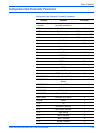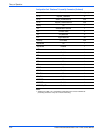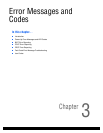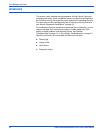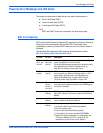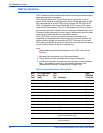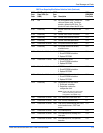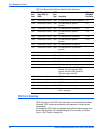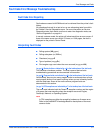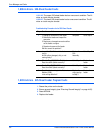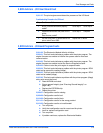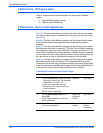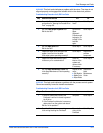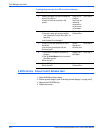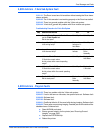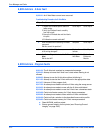
Phaser 8400/8500/8550/8560 Color Printer Service Manual 3-7
Error Messages and Codes
Fault Code Error Message Troubleshooting
Fault Code Error Reporting
Fault codes are saved to NVRAM and can be retrieved from the printer’s fault
history.
All procedures that ask for a test to be run are referencing tests from within
the “hidden” Service Diagnostics menu. For more information on Service
Diagnostics tests, their results, and how to enter into diagnostic mode, see
“Service Diagnostics” on page 4-4.
In normal customer mode, the printer will reboot each time an error occurs. If
three of the same errors occur within 72 hours, or 1000 pages, the fault is
displayed on the printer’s Control Panel.
Interpreting Fault Codes
■ Failing system (XX,yyy.zz)
■ Failing subsystem (xx,YYY.zz)
■ Checksum (xx,yyy.zZ
■ Type of problem (xx,yyy.Zx)
■ Print engine copy count when the error occurred (xx,yyy.zz:123)
(xx,yyy.4x) Device faults are indicated by a 4 in the tenths place of the fault code.
This indicates a hardware problem. The most common device faults
troubleshooting procedures are documented in this section.
(xx,yyy.6x) Program faults are indicated by a 6 in the tenths place of the fault code.
Unfortunately, there are too many program faults to enumerate them all and
most program faults will not mean anything unless you are intimately familiar
with the code base. Some of the more common program faults are
documented in this section.
(xx,yyy.7z) CPU exceptions are indicated by a 7 in the tenths place of the fault code.
The error code indicates both the PowerPC exception number and the region
of firmware that was executing when the exception occurred: Engine,
PostScript, Network, or Operating System.
N
o
t
e
A CPU exception can either be caused by hardware or firmware error.
Refer to the infoSMART Knowledge Base for descriptions of the most
common faults.



